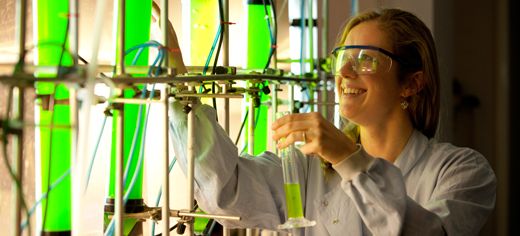
The University of Leeds has been successful in its bid to host two new training centres for PhD students, in plans announced today by Universities and Science Minister, David Willetts.
The new Centres for Doctoral Training (CDT) in Bioenergy and Fluid Dynamics are part of a £350 million national scheme – the UK's largest ever investment in post graduate training in engineering and physical sciences. The funding, targeted at areas vital to economic growth, has been allocated by the Engineering and Physical Sciences Research Council (EPSRC).
The University of Leeds will also be a partner in a further three CDTs that will be hosted by other institutions: Soft Matter and Functional Interfaces (hosted by the Durham University), Integrated Tribology (hosted by the University of Sheffield) and Nuclear Fission - Next Generation Nuclear (hosted by the University of Manchester).
Professor David Hogg, Pro-Vice-Chancellor for Research and Innovation at the University of Leeds, said: “I am delighted by both our success in bringing two new CDTs to our University campus, and in the CDT partnerships that we have secured. Investing in the training of young researchers in engineering and physical sciences is of vital importance for the University and its industry partners.”
In each of the two CDTs hosted by the University of Leeds, 10 PhD studentships will be offered per year for five consecutive years, covering a wide scope of research topics that span many of the Schools within the University.
For example, applications of fluid dynamics – the study of the flow of liquids and gases – include weather forecasting, monitoring and controlling pollution in rivers, wind power generation, combustion and mixing in engines and power stations, and the production of many consumer beauty products.
Professor Peter Jimack, Dean of the Faculty of Engineering at the University of Leeds, and the lead proposer for the CDT in Fluid Dynamics, said: “We anticipate that the majority of the postgraduates from the Fluid Dynamics CDT will work in UK industry. Fluid dynamics arises across a multitude of industrial and environmental sectors, and the need for highly-skilled employees, with a broad and deep knowledge of fluid flow, is growing rapidly.”
Similarly, PhD studentships offered by the Bioenergy CDT will be multidisciplinary, covering important environmental challenges, such as ensuring that bioenergy sources can be sustainably and responsibly produced, as well as addressing technological and economic barriers.
Professor Jenny Jones, from the Energy & Resources Research Institute at the University of Leeds, and the lead proposer for the CDT in Bioenergy, said: "Bioenergy is crucial for delivering affordable, sustainable and renewable energy in the UK and internationally. The trained individuals emerging from the Centre will help transform our energy sector to low carbon processes. We are looking forward to leading this exciting opportunity to work with bioenergy stakeholders in delivering world-class research and training."
Further information
Professor Peter Jimack and Professor Jenny Jones are available for interview. Please contact Sarah Reed, Press Officer, University of Leeds on 0113 34 34196 or email s.j.reed@leeds.ac.uk